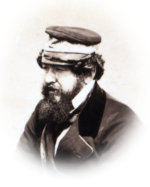October 8th.–A review of the artillery at this side of the river took place to-day, which has been described in very inflated language by the American papers, the writers on which–never having seen a decently-equipped force of the kind–pronounce the sight to have been of unequalled splendour; whereas the appearance of horses and men was very far from respectable in all matters relating to grooming, cleanliness, and neatness. General Barry has done wonders in simplifying the force and reducing the number of calibres, which varied according to the fancy of each State, or men of each officer who raised a battery; but there are still field-guns of three inches and of three inches and a-half, Napoleon guns, rifled 10 lb. Parrots, ordinary 9-pounders, a variety of howitzers, 20-lb. Parrot rifled guns, and a variety of different projectiles in the caissons. As the men rode past, the eye was distressed by discrepancies in dress. Many wore red or white worsted comforters round their necks, few had straps to their trousers; some had new coats, others old; some wore boots, others shoes; not one had clean spurs, bits, curb-chains, or buttons. The officers cannot get the men to do what the latter regard as works of supererogation.
There were 72 guns in all; and if the horses were not so light, there would be quite enough to do for the Confederates to reduce their fire, as the pieces are easily handled, and the men like artillery and take to it naturally, being in that respect something like the natives of India.
Whilst I was standing in the crowd, I heard a woman say, “I doubt if that Russell is riding about here. I should just like to see him to give him a piece of my mind. They say he’s honest, but I call him a poor pre-jewdiced Britisher. This sight’ll give him fits.” I was quite delighted at my incognito. If the caricatures were at all like me, I should have what the Americans call a bad time of it.
On the return of the batteries a shell exploded in a caisson just in front of the President’s house, and, miraculous to state, did not fire the other projectiles. Had it done so, the destruction of life in the crowded street–blocked up with artillery, men, and horses, and crowds of men, women, and children – would have been truly frightful. Such accidents are not uncommon–a waggon blew up the other day “out West,” and killed and wounded several people; and though the accidents in camp from firearms are not so numerous as they were, there are still enough to present a heavy casualty list.
Whilst the artillery were delighting the citizens, a much more important matter was taking place in an obscure little court house–much more destructive to their freedom, happiness, and greatness than all the Confederate guns which can ever be ranged against them. A brave, upright, and honest judge, as in duty bound, issued a writ of habeas corpus, sued out by the friends of a minor, who, contrary to the laws of the United States, had been enlisted by an American general, and was detained by him in the ranks of his regiment. The officer refused to obey the writ, whereupon the judge issued an attachment against him, and the Federal brigadier came into court and pleaded that he took that course by order of the President. The court adjourned, to consider the steps it should take.
I have just seen a paragraph in the local paper, copied from a west country journal, headed “Good for Russell,” which may explain the unusually favourable impression expressed by the women this morning. It is an account of the interview I had with the officer who came “to trade” for my horse, written by the latter to a Green Bay newspaper, in which, having duly censured my “John Bullism” in not receiving with the utmost courtesy a stranger, who walked into his room before breakfast on business unknown, he relates as a proof of honesty (in such a rare field as trading in horseflesh) that, though my groom had sought to put ten dollars in my pocket by a mild exaggeration of the amount paid for the animal, which was the price I said I would take, I would not have it.
